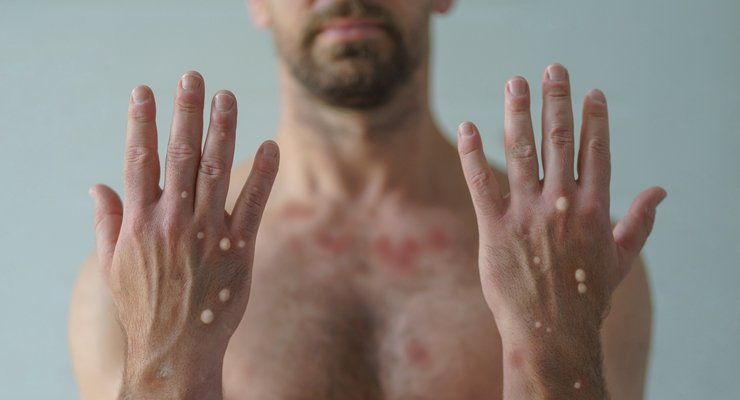Altadena Now is published daily and will host archives of Timothy Rutt's Altadena blog and his later Altadena Point sites.
Altadena Now encourages solicitation of events information, news items, announcements, photographs and videos.
Please email to: Editor@Altadena-Now.com
- James Macpherson, Editor
- Candice Merrill, Events
- Megan Hole, Lifestyles
- David Alvarado, Advertising


Friday, October 17, 2025
Los Angeles County Reports First Locally Transmitted Clade I Mpox Case

File photo of a man presenting with apparent symptoms of monkeypox. [Shutterstock]
The announcement is intended to alert residents and encourage testing, vaccination and preventive action to contain potential spread. The City of Long Beach announced its own clade I mpox case earlier this week. In 2025, 118 clade II cases have been reported countywide.
“This identification of cases of clade I mpox, which may cause more severe illness than the more common clade II, is concerning,” said Dr. Muntu Davis, Los Angeles County Health Officer. “Mpox continues to be spread largely through close, intimate contact with symptomatic people, mainly during sexual activity.”
Health officials are conducting contact tracing and enhanced surveillance to identify additional cases. The Los Angeles County Department of Public Health is collaborating with California state health authorities and the U.S. Centers for Disease Control and Prevention on the investigation.
Clade I mpox appears more severe than clade II, which has caused milder cases since 2022, and may spread more easily through intimate or household contact, according to public health officials.
Davis emphasized that vaccination remains critical to containing the outbreak. “Getting both doses of the JYNNEOS vaccine provides the best protection against mpox,” he said.
The two-dose JYNNEOS vaccine, which protects against both clades, is available for residents at higher risk, including gay, bisexual, or other men who have sex with men; transgender and gender-diverse individuals; people with HIV or taking PrEP; and those anticipating intimate contact while traveling to affected areas. Vaccines are accessible at pharmacies, sexual health clinics, and through insurance or public programs including Medi-Cal, ADAP and PrEP-AP.
Health officials urge residents experiencing symptoms—including rash, fever, chills, headache, or swollen lymph nodes—to seek medical evaluation promptly. Healthcare providers are advised to test suspected cases and expedite notification for individuals recently returned from Africa.
Public Health continues to recommend protective measures: avoiding close contact if symptoms appear, reducing casual sexual contact, exchanging contact information with new partners, and using condoms and gloves during sexual activity.
Altadena Calendar of Events
For Pasadena Events, click here










